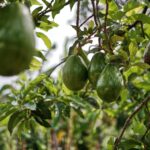USDA announces grants to help solve problems in avocado orchards

New USDA grants totaling US$6.3 million will help the University of California-Riverside (UCR) solve problems facing U.S. avocado orchards, including a lethal fungal disease called Laurel Wilt.
Laurel Wilt can destroy an entire avocado orchard in a couple of weeks once symptoms develop.
It is already present in Florida and without effective treatments, it will inevitably spread to California, which is the nation’s leading producer of avocados.
“When the beetle attacks, the fungus enters and colonizes the tree’s vascular system, and within weeks, the tree wilts and dies if not managed properly,” said Patricia Manosalva, director of this project as well as UCR’s Avocado Rootstock Breeding Program.
In addition to Laurel Wilt, avocado growers face numerous production challenges including diseases such as Phytophthora root rot (PRR), and soil salinity, which in combination can cause severe reductions in fruit yield and quality.
To combat the threats, the USDA’s National Institute of Food and Agriculture Specialty Crop Research Initiative has awarded UC Riverside US$ 4.4 million.
The grant will enable the development of technology and research on both short- and long-term solutions for managing avocado PRR, the major hindrance for avocado production worldwide.
Approaches to mitigate avocado threats such as field trials of rootstocks harboring resistance to the pathogen and the advancement of remote field sensors that can detect and differentiate drought from high salinity and PRR will be developed.
“We’ve been developing agricultural science for a long time,” she said. “This grant will allow us to keep moving the UCR rootstock breeding program forward and continue developing hearty avocado rootstocks.”
Through the Office of Technology Partnerships, UCR currently has three rootstocks available for licensing in the U.S. and may have up to five new rootstocks available in the next few years.
The new rootstocks could provide increased tolerance to disease, drought, heat and soil salinity.
In a related grant, the USDA’s National Institute of Food and Agriculture, Organic Agriculture Research and Extension Initiative awarded US$ 1.9 million to a team to study whether essential oils can help suppress certain pathogens and pests.
Producers of essential oils claim their products may be able to treat plant pathogens such as gray mold, powdery mildew, algal stem blotch and brown rot as well as insects including mites, thrips and scales.
Manosalva believes the grants highlight the importance of funding basic research in agricultural science.
“California’s produce feeds the nation as well as the world. Our science will help feed people and empower growers everywhere,” she said.















































